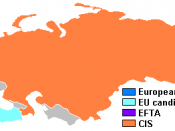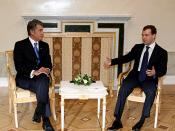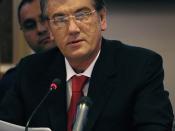The question of democracy and liberal ideals has been quite a stir in Eastern Europe, particularly in the Ukraine, in recent months. The Ukraine, a former Soviet Republic and part of the Commonwealth of Independent States (CIS) now has a newly elected liberal-minded President Viktor Yushenchenko. Mr. Yushenchenko in under pressure from its neighbouring country Russia, whether he will sign a renewed accord of the Common Economic Space (CES) or decide to join the European Union (EU).
International Relations and Eastern European politics have become an interest for me in the last year. What I found most interesting was the elections in the Ukraine. Eventually, this led me the interest in writing my essay on the CES. Will the Ukraine reaffirm its accord to reform the CES in a free-trade agreement with Russia, Belarusse and Kazakhstan in a Common Economic Space? Two International Relation (IR) theories that I believe apply to this essay is how does liberalism and democracy, liberalist theory come into play with regard to the CES and another is whether President Yushchenko will agree to a renewed agreement of the CES or decide to start the process to join the EU.
This leads me to think of the balance of power and whether Mr. Yushchenko will be a balancer or bandwagon. Alternatively, will Russia balance with Ukraine in order to strengthen itself economically, and on foreign policy, and military power to form a new Eurasian geopolity? The newly elected Ukrainian President Viktor Yushchenko now has the tough decision in the next few years of either renewing a Common Economic Space (CES) agreement with Russia, Belarus and Kazakhstan or join the European Union (EU), which would make the Ukraine have a closer tie with the West and break away from the authoritarian and imperialist tie with Russia.


